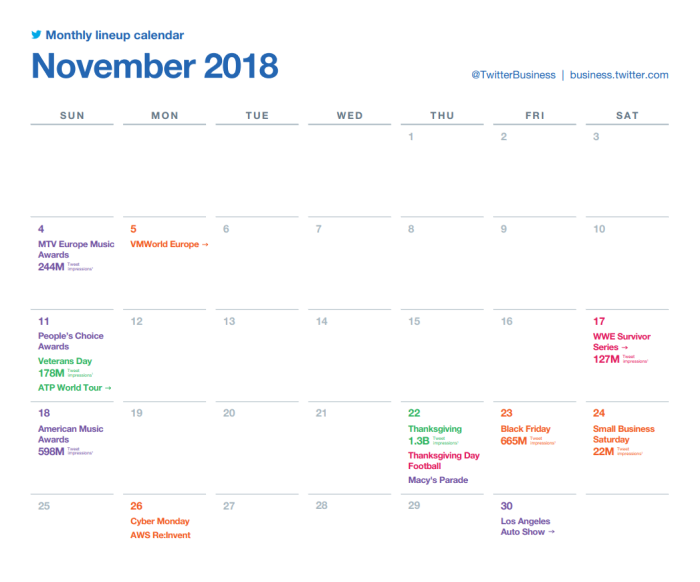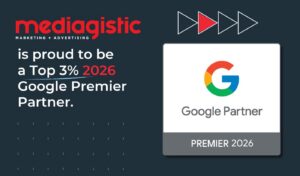
Last Week in Digital Marketing: Google Cracks Down on Bots While Changes for Twitter are on the Horizon
As usual, Google is bringing about more changes in efforts to improve. Meanwhile, Twitter chooses to try out bringing back a feature from its past.
Twitter Releases November Calendar of Events
Twitter likes to help out the small businesses and large corporations that advertise on their platform. That’s why they created a calendar of events for November that lists significant tweet days, such as the MTV Europe Music Awards and Cyber Monday. For some holidays, the calendar shows how many tweet impressions are likely to occur on that day, based on previous years.

Takeaway: When creating an editorial calendar for November, social media specialists and advertisers should make note of days with high numbers of tweet impressions so they can benefit from high levels of engagement on Twitter.
Is Twitter Going Back to the Chronological Timeline?
As of Nov. 1, Twitter started testing the chronological timeline in certain users’ feeds. This used to be the norm, before Twitter switched to an algorithmic timeline back in 2016.
”Sometimes you want to see the latest Tweets, first,” the company said in a post last Wednesday. “We’re testing a way for you to make it easier to switch your timeline between the latest and top Tweets. Starting today, a small number of you will see this test on iOS.”
The “compose tweet” button that used to be at the top right of the screen was removed and a triple-star icon took its place, which is how users can switch to the chronological timeline view. It’s still unclear if the app will automatically switch back to the algorithmic timeline when it’s reopened, or if many people will even use the chronological view. However, it’s a step in the right direction that Twitter is actively trying to give its users what they want.
Takeaway: Adding the ability to sort a timeline chronologically gives users more power, but it could also result in decreased engagement, since the content may not be as relevant as that in an algorithmic timeline.
Google Tightens Down on AdSense Accounts
In order for you to monetize your site with AdSense advertising, you will now need to add it to your AdSense account for review. The site will go through a verification process to make sure you’re the owner of the site and can modify its content. Once Google approves the site, it will be marked as “ready” in your AdSense account. At this point, you can start displaying AdSense ads.
Most site owners won’t have to do anything as a result of this change, but some may have to confirm the correct ad code when they add a new site to their account. Double-check that the email address you have listed in your account is correct, because this is how Google will get in touch with you to confirm the ad code.
Takeaway: Google’s been working toward this for years as part of their initiative to facilitate the creation of relevant, non-spammy ads. This is just another added step of monitoring the ads that businesses create.
Google’s New API Aims to Control Bots and Malicious Users
Google’s made it easier to detect bots and malevolent users on your site with reCAPTCHA v3, which gives each user a score that says how suspicious their site interactions are. You can then determine the most appropriate action to take, based on the score. The best part is that all of this is done without interrupting site users by running adaptive risk analysis in the background.
The score reCAPTCHA v3 provides makes it possible for site owners to set a threshold that says when a user will be let through to a site or when further verification is needed (such as a phone verification).
”In short, reCAPTCHA v3 helps to protect your sites without user friction and gives you more power to decide what to do in risky situations,” Google said in a blog post. “As always, we are working every day to stay ahead of attackers and keep the Internet easy and safe to use (except for bots).” To learn how to enable and customize reCAPTCHA v3, visit https://developers.google.com/recaptcha/docs/v3.
Takeaway: Website owners have more power to block malicious users from their site, giving real, benevolent users a safer, more positive experience.
Google Wants to Use Artificial Intelligence to Interact with Small Businesses
While Google is trying to eliminate malicious bot usage online, it’s also trying to use artificial intelligence to its advantage. Recently, Google asked certain Google My Business profile owners if they’re willing to receive “Google Assistant calls.” This involves two things: letting Google Assistant confirm information about the small business and letting customers use Google Assistant to book reservations and appointments.
Using Google Assistant will decrease the labor needed on tasks such as verifying a business’s phone number, but there are several ethical implications involved. Some small business owners may be hesitant to answer a phone call from a bot; and customers may not trust a bot to make appointments for them.
In July of 2019, California will be implementing a law that requires companies who use artificial intelligence to disclose that a bot is speaking (not a human) and that these disclosures be “clear, conspicuous, and reasonably designed to inform persons with whom the bot communicates or interacts that it is a bot.”
Takeaway: Although Google is using technology to become more efficient, it may receive some pushback from both businesses and customers who are skeptical about AI.
Agencies Must Confirm Relationship with Business to Use Facebook Pixel
Throughout 2018, Facebook has been attempting to communicate more with users about how its advertising and targeting practices work. It’s latest initiative is with pixels and setting up events. Now, agencies must confirm their relationship with clients when creating a Facebook pixel, which is used to target ads more directly toward potential customers. Businesses can make this easier by assigning “advertising partners” when setting up a pixel so their agency is allowed access to it.
An agency that creates a new ad campaign involving a pixel will have to define the relationship with their client (the business page) when they set it up. Businesses that already have a pixel must update their information in the first half of 2019.
Takeaway: This is an extra step marketing and advertising agencies will have to implement when creating ad campaigns, but the overall process should not be significantly different than before.
By complying with new Facebook regulations and using Google capabilities to your advantage, your small business will rise above others in its industry. The LeadBuilder® team can take your business even further with the latest digital strategies and marketing practices. Contact us today to take the next step.
 Liz MacLean is an Inbound Marketing Specialist with experience managing social media and creating content for small businesses and nonprofit organizations. She is an award-winning writer who has produced photographs and articles about cooking, clothing, nature, and fitness for local magazines and newspapers.
Liz MacLean is an Inbound Marketing Specialist with experience managing social media and creating content for small businesses and nonprofit organizations. She is an award-winning writer who has produced photographs and articles about cooking, clothing, nature, and fitness for local magazines and newspapers.
Image via iStock
You May Also Like

Mediagistic Earns 2026 Google Premier Partner Status, Ranking Among the Top 3% of Agencies Nationwide
February 24, 2026Mediagistic is proud to announce that we have once again earned Google Premier Partner status for 2026. This distinction places us among… Continue Reading Mediagistic Earns 2026 Google Premier Partner Status, Ranking Among the Top 3% of Agencies Nationwide…

EPIC 2026 Recap: What Getting 1% Better Means for HVAC Marketing in 2026
February 19, 2026The Main Event of HVAC delivered exactly what the industry needed. At EGIA’s EPIC 2026, contractors, distributors, and partners from across the… Continue Reading EPIC 2026 Recap: What Getting 1% Better Means for HVAC Marketing in 2026…

HVAC Marketing in 2026: Industry Data, Trends & Growth Benchmarks for Contractors [Infographic]
February 1, 2026HVAC is picking up again in 2026, but competition is getting tougher. Costs are rising, and more companies are fighting for the… Continue Reading HVAC Marketing in 2026: Industry Data, Trends & Growth Benchmarks for Contractors [Infographic]…